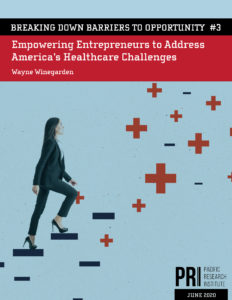 As Americans have benefited from tele-health and other innovations thanks to COVID-19 regulatory relief, future medical advances will be stymied unless policymakers remove road blocks that make it difficult for entrepreneurs to develop new technology and for patients to access it, finds the latest study in the Breaking Down Barriers to Opportunity series released today by the nonpartisan Pacific Research Institute.
As Americans have benefited from tele-health and other innovations thanks to COVID-19 regulatory relief, future medical advances will be stymied unless policymakers remove road blocks that make it difficult for entrepreneurs to develop new technology and for patients to access it, finds the latest study in the Breaking Down Barriers to Opportunity series released today by the nonpartisan Pacific Research Institute.
Click here to download the study.
“Many patients have seen how beneficial health care technology can be in providing high quality care during the COVID-19 crisis at a reasonable cost,” said Dr. Wayne Winegarden, PRI Senior Fellow in Business and Economics and the study’s author. “But soon, we’ll go back to the status quo and if an entrepreneur comes up with a more effective or efficient way to treat patients, overregulation will stand in the way. That’s wrong. We must fix this broken system so all patients can affordably access the latest health care innovations.”
Federal and state governments have temporarily relaxed several health care regulations in response to the COVID-19 crisis. Patients have been able to access innovations like tele-health, allowing them to talk with their doctors online without having to visit medical facilities that may have been impacted by the coronavirus. But these temporary reforms will soon expire.
“Empowering Entrepreneurs to Address America’s Health Care Challenges” shows that to fully realize the entrepreneurial health care revolution, government officials must make temporary regulatory reforms permanent and remove other government barriers like fixing the broken health care payment system.
A health care system driven by entrepreneurship can inspire future innovations that can solve many chronic health care problems, while better meeting patient needs and reducing costs. By embracing reforms, taxpayers, insurers, and patients could all benefit. These benefits include:
- Saving money by encouraging patient-focused innovations like tele-health that better serve patients at lower costs;
- Improving the quality of health care and saving money through the use of new technology and better delivery models; and
- Putting patients in charge of their health care through tax-advantaged health savings accounts, which can be spent at providers that deliver cutting-edge care.
As some in Washington call for “Medicare for All,” or a public option that would be the stepping stone to single-payer health care, Winegarden argues that expanding the role of government in our health care will only make the problems worse.
“Government control is a large driver of America’s health care problems,” said Winegarden. “Bureaucrats can’t revolutionize health care – only entrepreneurs can. By empowering health care entrepreneurs, we can create an American health care system that is more affordable, accessible, and productive for all.”
Dr. Wayne Winegarden is a Senior Fellow in Business and Economics, and Director of the Center for Medical Economics and Innovation at Pacific Research Institute.
